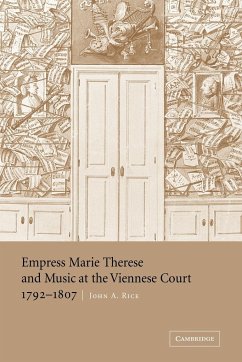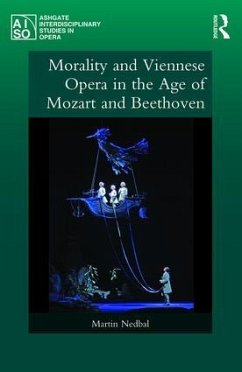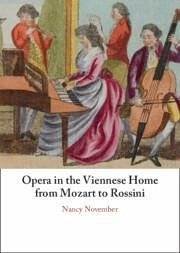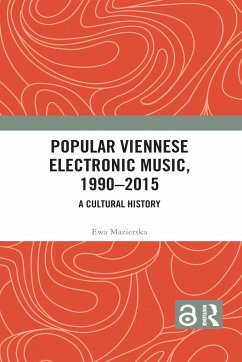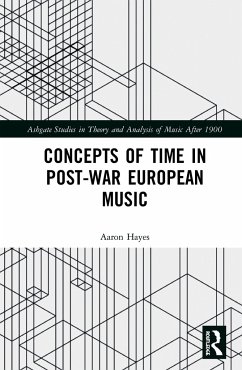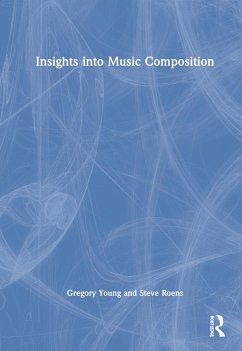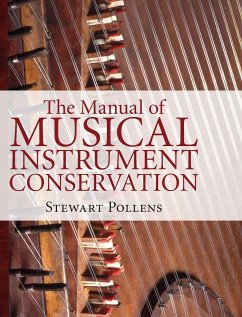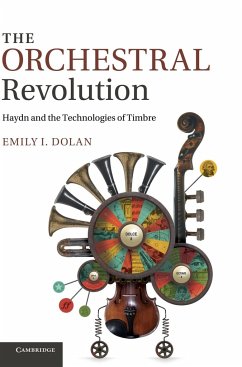
Empress Marie Therese and Music at the Viennese Court, 1792 1807

PAYBACK Punkte
62 °P sammeln!
Study of Empress Marie Therese as music patron in the Vienna of Haydn and Beethoven.This is the first study of the musical activities of Empress Marie Therese, one of the most important patrons in the Vienna of Haydn and Beethoven. Building on extensive archival research, including many documents published here for the first time, John A. Rice describes Marie Therese's activities as commissioner, collector, and performer of music, and explores the rich and diverse musical culture that she fostered at court. This book, which will be of interest to musicologists, historians of artistic patronage...
Study of Empress Marie Therese as music patron in the Vienna of Haydn and Beethoven.
This is the first study of the musical activities of Empress Marie Therese, one of the most important patrons in the Vienna of Haydn and Beethoven. Building on extensive archival research, including many documents published here for the first time, John A. Rice describes Marie Therese's activities as commissioner, collector, and performer of music, and explores the rich and diverse musical culture that she fostered at court. This book, which will be of interest to musicologists, historians of artistic patronage and taste, and practitioners of women's studies, elucidates this remarkable woman's relations with a host of professional musicians, including Haydn, and argues that she played a significant and hitherto unsuspected role in the inception of one of the era's greatest masterpieces, Beethoven's Fidelio. Other composers discussed include Domenico Cimarosa, Joseph Eybler, Michael Haydn, Johann Simon Mayr, Ferdinando Paer, Antonio Salieri, Joseph Weigl, and Paul Wranitzky.
Table of content:
Acknowledgements; List of illustrations; List of tables; List of music examples; List of abbreviations; Two intertwining family trees: the Habsburg-Lorraines of Vienna and the Bourbons of Spain and Naples; Note about quotations; Introduction; 1. The Empress as collector of music; 2. Marie Therese's musicians; 3. The Empress as soprano; 4. Private concerts; 5. Celebrations of Franz's birthday and nameday; 6. Musical caprice; 7. Marie Therese's influence on music in the public sphere; 8. The Empress as conceiver, commissioner, and shaper of musical works; 9. Il conte Clo: a birthday cantata from inception to performance; 10. Joseph Haydn and Beethoven between Court and nobility; Epilogue; Appendix 1: Marie Therese's collection of church music; Appendix 2: Marie Therese's musical diary, 1801-1803; Appendix 3: Paer's letters to the Empress; Appendix 4: Correspondence between Paisiello and Marie Therese; Appendix 5: Documents pertaining to the development and performance of Paer's Il conte Clo; Bibliography; Index.
This is the first study of the musical activities of Empress Marie Therese, one of the most important patrons in the Vienna of Haydn and Beethoven. Building on extensive archival research, including many documents published here for the first time, John A. Rice describes Marie Therese's activities as commissioner, collector, and performer of music, and explores the rich and diverse musical culture that she fostered at court. This book, which will be of interest to musicologists, historians of artistic patronage and taste, and practitioners of women's studies, elucidates this remarkable woman's relations with a host of professional musicians, including Haydn, and argues that she played a significant and hitherto unsuspected role in the inception of one of the era's greatest masterpieces, Beethoven's Fidelio. Other composers discussed include Domenico Cimarosa, Joseph Eybler, Michael Haydn, Johann Simon Mayr, Ferdinando Paer, Antonio Salieri, Joseph Weigl, and Paul Wranitzky.
Table of content:
Acknowledgements; List of illustrations; List of tables; List of music examples; List of abbreviations; Two intertwining family trees: the Habsburg-Lorraines of Vienna and the Bourbons of Spain and Naples; Note about quotations; Introduction; 1. The Empress as collector of music; 2. Marie Therese's musicians; 3. The Empress as soprano; 4. Private concerts; 5. Celebrations of Franz's birthday and nameday; 6. Musical caprice; 7. Marie Therese's influence on music in the public sphere; 8. The Empress as conceiver, commissioner, and shaper of musical works; 9. Il conte Clo: a birthday cantata from inception to performance; 10. Joseph Haydn and Beethoven between Court and nobility; Epilogue; Appendix 1: Marie Therese's collection of church music; Appendix 2: Marie Therese's musical diary, 1801-1803; Appendix 3: Paer's letters to the Empress; Appendix 4: Correspondence between Paisiello and Marie Therese; Appendix 5: Documents pertaining to the development and performance of Paer's Il conte Clo; Bibliography; Index.





